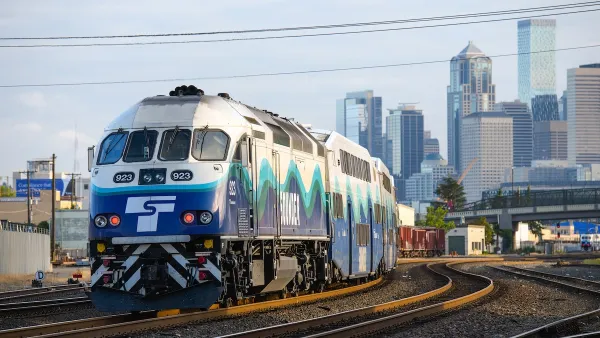An initial review by City Observatory's Joe Cortright doesn't find much to indicate that the new U.S. DOT 's performance measurement rule for transportation systems will set a new transportation policy agenda.

"We’ve just gotten our first look at the new US Department of Transportation performance measurement rule [pdf] for transportation systems," writes Joe Cortright, who begins the process of evaluating whether the new rule will address the longstanding shortage of quantitative standards for measuring transportation systems.
After arguing for the importance of these rule—and debunking the notion that standards such as these are the sole province of technocratic trivia—Cortright provides an initial assessment framed by the words "excessive" and "expectations." Perhaps unsurprisingly, Cortright quickly identifies shortcomings in the rule, such as its priority on vehicle, not personal delay. "So a bus with 40 or 50 passengers has its vehicle delay weighted the same amount according to this metric as a single occupancy vehicle," explains Cortright.
Although Cortright acknowledges that the new rule is an improvement over other measures, like the Texas Transportation Institute's Travel Time Index, the measure "seems to impart a strong 'build, baby, build' bias to the indicators." Cortright also notes specifically that only six pages of the 425-page document addresses greenhouse gas emissions. Even those six pages "read like a bad book report and a 'dog-ate-my-homework' excuse for doing nothing now."
FULL STORY: Excessive expectations: A first look at the DOT’s new road performance rules

Planetizen Federal Action Tracker
A weekly monitor of how Trump’s orders and actions are impacting planners and planning in America.

San Francisco's School District Spent $105M To Build Affordable Housing for Teachers — And That's Just the Beginning
SFUSD joins a growing list of school districts using their land holdings to address housing affordability challenges faced by their own employees.

The Tiny, Adorable $7,000 Car Turning Japan Onto EVs
The single seat Mibot charges from a regular plug as quickly as an iPad, and is about half the price of an average EV.

Seattle's Plan for Adopting Driverless Cars
Equity, safety, accessibility and affordability are front of mind as the city prepares for robotaxis and other autonomous vehicles.

As Trump Phases Out FEMA, Is It Time to Flee the Floodplains?
With less federal funding available for disaster relief efforts, the need to relocate at-risk communities is more urgent than ever.

With Protected Lanes, 460% More People Commute by Bike
For those needing more ammo, more data proving what we already knew is here.
Urban Design for Planners 1: Software Tools
This six-course series explores essential urban design concepts using open source software and equips planners with the tools they need to participate fully in the urban design process.
Planning for Universal Design
Learn the tools for implementing Universal Design in planning regulations.
Smith Gee Studio
City of Charlotte
City of Camden Redevelopment Agency
City of Astoria
Transportation Research & Education Center (TREC) at Portland State University
US High Speed Rail Association
City of Camden Redevelopment Agency
Municipality of Princeton (NJ)





























